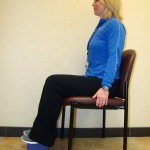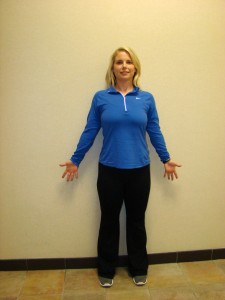by Michelle Sutton-Kerchner
There’s a simple thing you can do right this minute to improve your health. Whether standing, sitting, or mobile, take a second and make it better …
Check your posture. Holding your frame correctly helps prevent aches, pains, and overall fatigue. Slouching puts strain on ligaments and muscles. Then, the spine must struggle to keep the body balanced. Over time, this wears on your spine’s natural positioning. The body compensates for the imbalanced state, pulling muscles and vertebrate out of alignment.
A Refresher on Good Posture
Standing:

Standing with good posture requires your body’s weight to be evenly distributed on both feet. Actually, this is an amazing feat in itself: You are resting an entire structure of many pounds on a pair of Nikes. Keep those feet parallel, pull in your abs and buttocks, and hold your chest high.
Now, keep your shoulders back and relaxed. Most often, this is the biggest posture challenge. Many slump shoulders forward or hold them tense. Do you find your shoulders creeping up toward your ears as the day progresses? This tense habit is considered a form of bad posture. If you generally hold your tension in the neck and shoulder area, this could be a postural weakness for you. Take note on a frequent basis. How are you holding yourself? Breathe. Realign. Relax.
Shoulder slumping reduces chest muscles and makes them less flexible. Poor posture prohibits lungs from breathing deeply, thereby preventing muscles from getting oxygen needed for optimum performance.
Pulling shoulders back too far causes the abs and hips to protrude. It is clearly visible how this posture blooper misaligns the entire body. It can also give the appearance of a gut, despite your best stomach-crunching efforts on the Exercise Floor.
Don’t lock your knees. This is a habit not typically associated with bad posture, but an offender just the same. Locking your knees affects your gait and overall stance. Plus, it makes your knees sore– a convenient excuse to dodge window shopping with a shopaholic friend, but not so good if you’re standing at a sold-out concert.
Imagine a string pulling up from your core, extending to the ceiling. Envision yourself solid and balanced. Focus and hold your ground.
Sitting:

Keep your knees level with your hips. If your favorite chair or work chair doesn’t allow this, then use a foot stool to lift your feet to knee level. Using a stool also helps ease lower back strain and pain.
Lean so your back, including your upper back and shoulders, are resting against the length of the chair. For support in your lumbar spine (lower back), insert a rolled towel or small pillow behind your spine’s natural curve. Keep head and neck straight, but relaxed. Spot check those shoulders. Are they migrating to your earlobes?
If you’re keyboarding, wrists should be supported by a wrist pad or keyboard holder. The latest in ergonomics offers everything from a bizarrely curved computer mouse to a gel-filled wrist cushion. Find what works for you and use it. When leisurely reading a book, use a pillow or lap desk for easy visibility. Even though you aren’t at your desk, your spine is still on duty. No slumping.
Desk chairs come with many options for the modern office. Choose one that goes the full length of your back and neck, has arm rests, and adjustable height control. (You can’t carry a stool everywhere.) The arm rests are great support when getting up and down. Use them. It’s the smart way to rise and lower out of a chair, and has nothing to do with weakness.
Sleeping:
By the time you collapse into bed at night, you probably aren’t giving much thought to your sleeping posture. We’ve all caught ourselves with upper body heading in one direction and lower facing the other. Before you blame your mattress for a sore morning, consider your sleeping position.
Although in a reclining position, the body still needs support. Use towels or neck rolls to support your spine, whether sleeping in bed or relaxing on the couch. A rolled towel or rounded pillow tucked under your neck can be soothing. There are even microwavable wraps that add warmth to the support. When reclining, tuck a pillow or towel roll under bent knees and instantly feel pressure eliminated from your lower back. When you finally grab some sleep, make it count.
Make a Stand with These Exercises
Pilates emphasizes core strength. With a strong core, you can achieve better posture. Don’t rely on exaggerated muscle positioning to accomplish proper alignment. Engaging the ab, back, and pelvic floor muscles to achieve proper posture allows the rest of the body optimal stress-free movement.
Yoga can reduce slouching with moves that improve posture as well as increase body awareness. Days spent in front of a computer, behind the car steering wheel, and holding hands with knee-high tots promote bad alignment.

The main focus of Yoga’s basic Mountain Pose is finding the neutral position and experiencing symmetry on either side of the body. Practicing this pose allows recognition of true perfect alignment. It can be done anywhere to gauge your current posture status.
Other recommended poses that encourage good posture include the standing forward bend variation, cat-cow stretch, and bridge pose. There are also yoga stretches that can be performed at your desk. These are ideal for maintaining mindful awareness of your physical self while at work.
Visit the Center’s Web site for the Group Fitness schedule. Speak with the instructors for more ideas, and try a class or two. It’s sure to be a perk-up in multiple ways.
Emotional stress and negative attitude affects our overall outlook and appearance. The absence of deep breathing is intricately connected to the body’s posture. Any exercise can help ward off posture-wrecking stress. However, yoga with its emphasis on breathing and the mind-body connection is particularly beneficial.
Hit the Exercise Floor to accomplish a workout that strengthens the upper back and shoulders. Bad posture sometimes results from an injury or weakened system of muscles. An imbalance develops as muscles try to guard a weak or painful area. The body’s natural alignment attempts to compensate, which often negatively affects posture.
Use the wall for support when lifting weights. This allows the body to remain correctly aligned. Any straining done from the spine will be immediately obvious and can be corrected quickly. Face forward, keep chin and head held high, knees slightly bent, and abs tightened. Now, you can truly work the intended areas.
Check the mirror or a window reflection throughout the day to see how you’re doing. Good posture is a habit that takes time to develop and maintain. The results are immediate though. You might not be in your goal-size clothes yet, but what you wear will lay better on your strong frame. With the body properly aligned, you instantly appear more confident, taller, and slimmer. Muscles function better, movement is more efficient, circulation improves, and pain can be reduced.
Stand tall, and reach great heights.
Sources
“Causes of Poor Posture,” by Anne Asher at www.about.com.
“Good Posture for People with Osteoporosis,” by Madeline Vann at www.everydayhealth.com.
“Pilates Posture Check,” by Marguerite Ogle at www.about.com.
“Prevent Back Pain with Good Posture,” at www.mayoclinic.com.
“Yoga to Improve Your Posture,” by Ann Pizer at www.about.com.
Image Credits
Tall trees (introductory photo): www.flickr.com/photos/24323419@N08/2387318567
Straight versus slouched: www.flickr.com/photos/perfectoinsecto/4272159055/
 Fitness & Wellness News Your Source for Fitness News, Wellness News, Health News, and Nutrition News!
Fitness & Wellness News Your Source for Fitness News, Wellness News, Health News, and Nutrition News!



